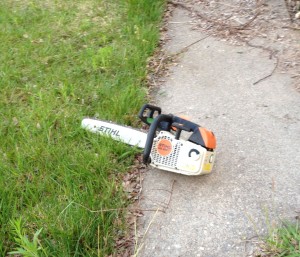Are Property Owners Liable for Contractors’ Injuries? (Part 1)
Contractors and other workers sometimes incur injuries in the course of their employment. When those injuries occur on private property, questions may arise about whether or not the owner of the land on which the injury occurred is liable (in negligence or otherwise) for damages to the injured party. In the coming days, we’ll take a closer look at the duty an owner (or possessor) of land may owe, or not owe, to contractors and other workers.

THE GENERAL RULE: NO LAND OWNER DUTY TO INJURED WORKERS
As a general rule, injured workers (employees of contractors hired by the land owner) cannot recover damages from the landowner in the event of a work-related injury. When a property owner hires a contractor to perform work on private property, the contractor has responsibility for overseeing and managing the work in question. Working conditions, tools, and other aspects of the project thus become the contractor’s primary responsibility. Since the contractor–not the owner–normally has primary control over the work and the manner of its completion, injured employees generally must seek compensation from the contractor (or worker’s compensation), not the property owner.
However, like many other rules, the law recognizes quite a few exceptions. In fact, so many exceptions exist that at least one case has described the rule as “primarily important as a preamble to the catalog of its exceptions.” (Privette v. Sup.Ct., 5 C4th at 693, 21 CR2d at 74)
EXCEPTIONS: WHEN THE LAND OWNER MAY BE LIABLE FOR INJURIES TO CONTRACTORS’ EMPLOYEES
Among the most frequently used (and cited) exceptions to the general “rule” that landowners are not liable for injuries to contractors’ workers are:
1. Where the work is “inherently dangerous.”
2. Where the land owner provides defective equipment or fails to warn the workers (or contractor) of a pre-existing hazardous condition.
3. Where the land owner has a “nondelegable duty” toward third parties.
4. Where the land owner retains control of the work (essentially, fulfilling the contractor’s role).
LIABILITY MAY ATTACH WHEN THE PROPERTY OWNER RETAINS CONTROL OVER THE WORK
Sometimes, property owners act as “general contractors,” hiring subcontractors and managing work on the property. In other cases, the property owner may hire one or more contractors but still retain control over the work performed. Generally speaking, if the property owner retains management and control over the work, (s)he may also be liable for failing to exercise due care if the owner’s actions were a substantial factor in and/or cause of the worker’s injury.
Workers claiming damages will still have to prove the elements of a negligence claim against the property owner–including the owner’s breach of a duty owed to the injured person, causation, and damages. The claim will have to be proven to the applicable legal standard. The fact that a property owner maintained control of work on the property, without more, is not proof of negligence or liability, even if injuries occur. However, the owner’s control over the work does create a possibility of liability, especially where the property owner failed to take appropriate steps to prevent injuries in the work environment.
If you, or someone you know, has been injured on the job, consult an experienced attorney immediately. Delay could impact your legal rights or even prevent you from recovering on your claim.















